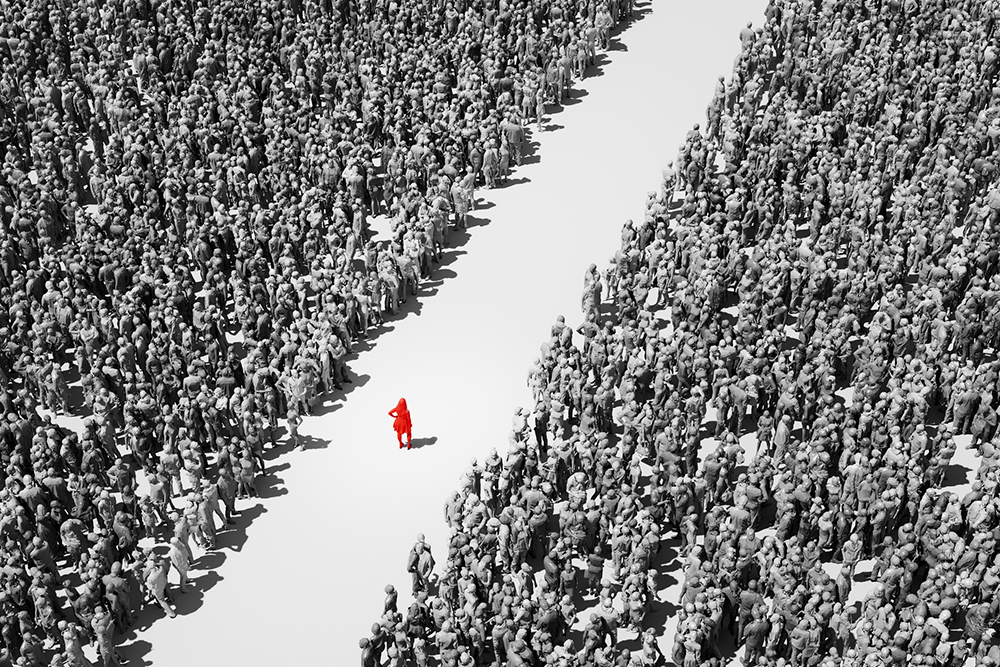What’s a guy got to do these days to take a pee in peace? Standing at the urinal in London King’s Cross train station, I was trying to embrace the present, not dwell on the failures of the past or the great trials to come; and for a brief moment, I felt that Zen-like tranquillity that, as all guys know, is key to avoid a freeze moment at a public urinal. But then, ‘MALE SUICIDE IS AN INCREASING PROBLEM. IF YOU OR ANYONE YOU KNOW ARE HAVING THOUGHTS…’ blared the Tannoy system.
My inner Buddha fled. I left the public toilets thinking, ‘hmm, I don’t think I’ve been feeling particularly suicidal of late… But maybe?’ I was soon gazing at the latest poster campaign for prostate cancer (anti, not pro). One in eight! It sounds like the dire odds a second lieutenant faced on the front line in the first world war. Why the sudden keenness around prostates? We’re all going to go one day, and the grim reaper has an endless arsenal to choose from.
‘I look back to those moments of supreme male fitness as one remembers champagne or a morning swim’
It’s worth remembering some of the research around social psychology and labelling. We know, for example, that persistently repeating something makes people believe its true. So what happens when we repeatedly tell men that male suicide is a problem? And the concern about male suicide seems a bit rich following decades of media hammering on about toxic masculinity, the devilish male gaze and the Homer Simpson-ification of manhood – especially fatherhood – whereby men are presented as permanently flummoxed, in need of setting straight by their womenfolk. What about analysing how that unflattering depiction might be influencing the worsening rates of male suicide?
What’s going on with these various campaigns? Firstly, you have the ‘regulation mania, in all its extravagance and absurdity’, that Mattias Desmet wrote about in The Psychology of Totalitarianism. This increasingly extends to the state regulation of our mental and physical ‘well-being’. It’s why a party that describes itself as conservative tried to bring in an outright ban on smoking.
Then you have what anthropologist David Graeber addressed in his 2018 book Bullshit Jobs: A Theory. He takes to task the proliferation of meaningless jobs, analysing their societal harm and the ‘managerial feudalism’ that gives rise to them. The suicide prevention and prostate campaigns, while ostensibly well-meaning, seem to me to have been created by people in such jobs. Of course, we all believe that preventing suicide and prostate cancer is important. But are those problems solved by a blast of marketing speak over a train station Tannoy? How many meetings took place to decide on the exact wording of a poster on evidence of a dodgy prostate? Couldn’t these resources be better spent, perhaps on a functioning health service?
There is potentially another factor, which goes back to Homer Simpson: the continual undermining of masculinity and male confidence. A few years ago, the Chinese Academy of Social Sciences, a state-backed research institute, accused the CIA of promoting effeminate male celebrities and ‘sissy’ culture to weaken Asian masculinity. It highlighted the creation of androgynous male pop stars in countries like Japan. Anything coming from a Chinese governmental mouthpiece is suspect, but there is certainly a difference between the Samurai code and K-pop. Or consider a report by the Conservative Equalities Office from 2019, which was titled ‘Changing gender norms: engaging with men and boys’. Those norms included an aversion to showing weakness and the idea that men should be physically strong. Why are such things now presented as unmitigated negatives – norms that need to be changed?
As we’ve just been reminded during the UK riots, men, especially the younger male, can be a particularly difficult bunch when their energies are misdirected. But we forget, or simply dismiss, all the good that those energies can achieve – most of the physical bricks-and-mortar infrastructure of the world was built by sweating men. Jan Morris wrote one of the rarely heard defences of maleness in the book Conundrum that describes a ten-year quest to release the woman that she felt was trapped in her male body. ‘When it is working properly [the male body] is a marvellous thing to inhabit,’ she writes. ‘I look back to those moments of supreme male fitness as one remembers champagne or a morning swim. Nothing could beat me, I knew for sure; and nothing did.’
She’s right. It’s a great existence. But for others, such as the state and certain feminists, those supreme levels that men are blessed to achieve are troublesome, if not a reason for fear (and envy). And so they endeavour to restrain. To younger lads out there, I give you the counselling words given to d’Artagnan by his father at the start of Alexandre Dumas’s The Three Musketeers: ‘Suffer nothing from any man except the Cardinal and the King. It is by his courage, remember, by his courage alone, that a gentleman makes his way nowadays. The man who trembles for even a second perhaps allows the bait to escape him that Fortune was holding out to him at the very second.’ So don’t dwell on the Tannoy’s pronouncements; don’t tremble. Seek and ‘take advantage of everything that happens to you, and live happily and long.’








Comments